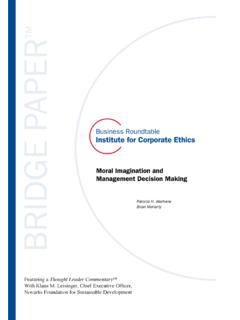Transcription of er P Bridge Pa - Business Roundtable Institute for ...
1 Featuring a Thought Leader Commentary with Charles O. Holliday, Jr. Chairman and chief executive officer , DuPontBridge PaPer Company Stakeholder Responsibility: A New Approach to CSRR. Edward FreemanS. Ramakrishna VelamuriBrian Moriarty 2006, Business Roundtable Institute for Corporate Policy: Bridge Papers may only be displayed or distributed in electronic or print format for non-commercial educational use on a royalty-free basis. Any royalty-free use of Bridge Papers must use the complete document. No partial use or derivative works of Bridge Papers may be made without the prior written consent of the Business Roundtable Institute for Corporate PDF version of this document can be found on the Institute Web site at: PaPers Uniting best thinking with leading Business ..2introduction ..2 Company stakeholder responsibility in Practice:Four Levels of Commitment to the stakeholder approach.
2 4 Ten Principles of Company stakeholder responsibility ..5a New Csr Company stakeholder responsibility ..8 Thought Leader Commentary with Charles O. Holliday, Jr..9about the authors ..133 Bridge PAPER : Company Stakeholder Responsibility: A New Approach to CSRFoRewoRdThe Business Roundtable Institute for Corporate Ethics is an independent entity established in partnership with Business Roundtable an association of chief executive officers of leading corporations with a combined workforce of more than 10 million employees and $ trillion in annual revenues and leading academics from America s best Business schools. The Institute , which is housed at the Darden Graduate School of Business Administration, brings together leaders from Business and academia to fulfill its mission to renew and enhance the link between ethical behavior and Business practice through executive education programs, practitioner-focused research and Bridge Papers put the best thinking of academic and Business leaders into the hands of practicing managers.
3 Bridge Papers convey concepts from leading edge academic research in the field of Business ethics in a format that today s managers can integrate into their daily Business decision making. Company Stakeholder Responsibility: A New Approach to CSR is an Institute Bridge PaperTM based on the research of R. Edward Freeman and S. Ramakrishna Velamuri. Based on a stakeholder approach, this paper outlines a new capability for organizations to develop. The accompanying interview with Charles O. Holliday, Jr., Chairman and chief executive officer , DuPont, provides a CEO perspective on how to embed a Company Stakeholder Responsibility mindset across the enterprise and in a firm s overall value Roundtable Institute for Corporate EthicsiNtRoduCtioNAssume that the CEO of a well-respected corporation is asked the following: Your company s products improve consumers lives.
4 Suppliers want to do Business with your company because they benefit from this relationship. Employees really want to work for your company, and are satisfied with their remuneration and professional development. And, you re a good citizen in the communities where you are located; among other things, you pay taxes on the profits you make. You compete hard but fairly. You also make an attractive return on capital for shareholders and other financiers. However, are you socially responsible? If a company like the aforementioned organization is enriching the lives of its stakeholders, then asking the additional question of whether or not it is socially responsible simply makes no sense it is a meaningless question. If a firm is doing all the things that this company does, then it deserves to be applauded and offered as an example for other firms to emulate.
5 If it is not doing them as satisfactorily as particular stakeholders think it ought, then these stakeholders could perhaps offer to help it do them better, rather than appeal to actions and responsibilities that lie outside its day to day activities. By talking of Business and social responsibility as if they are two separate things, we unintentionally promote the idea that they involve discrete thought processes and activities. The challenge is to promote a different way of doing Business that integrates considerations of Business , ethics, and society. Herein lies the problem with Corporate Social Responsibility. Corporate social responsibility (CSR) reinforces the separation thesis the idea that we can separate Business from ethics or society. This separation is an idea that reaches very deeply into Western culture.
6 It is reinforced by the disciplines of Business , by our major theoretical frameworks in management, and by many executives and Business thinkers themselves. At its worst it generates an absolutely destructive idea of capitalism that capitalism is about anything goes. After all, the theory says, it s just Business . Viewed in this way, corporate social responsibility becomes an add-on to ameliorate the supposedly harsh consequences of this view of capitalism. Let us go back to the example of the previously described corporation. By hiring employees, has it done something that is for the Business ? The answer to that question is a resounding and unqualified, Yes. Has it done something that is for society? The answer to that question is also a resounding, Yes. So, how do matters of employment count in the social ledger or the Business ledger?
7 A similar argument can be made for customers, communities, suppliers and financiers. These individuals and organizations are all full-fledged members of society if they benefit in their dealings with a company, then society benefits too, directly and social responsibility is often about seeming to do good works. And, while there is certainly nothing wrong with doing more good, there can be an implication that companies need to do good works because the underlying structure of Business is not good, or morally neutral. This is a destructive idea it fails to recognize the central role 5 Bridge PAPER : Company Stakeholder Responsibility: A New Approach to CSRIn short, if you take a creating value for stakeholders approach to Business , and if you acknowledge that ethics and values are as important in these relationships as they are in our other relationships with one another, then the idea of corporate social responsibility is superfluous.
8 A conceptual scheme that separates the social responsibilities of a corporation from its Business responsibilities has long outlived its is time to replace corporate social responsibility with an idea of company stakeholder responsibility, assigning a different meaning to This is not just semantics, but a new interpretation of the very purpose of CSR. Company signals that all forms of value creation and trade all businesses need to be involved. Stakeholder goes back to the first paragraph of this paper and suggests that the main goal of CSR is to create value for key stakeholders. And Responsibility implies that we cannot separate what we do in the workplace from Business plays globally in improving the well-being and prosperity of hundreds of millions of people. And, it can cause companies to act in bad faith and get involved in matters where they have little expertise.
9 This is not Milton Friedman s argument that the only social responsi-bility is to increase profits; rather it is a practical matter giving money to the opera doesn t make up (in any moral sense) for short-changing customers or We need to focus on how value is created in the basic Business proposition. How does this company make customers, suppliers, communities, employees, and financiers better off? Capitalism is a system of social coop-eration a system of working together to create value for each other, value which none of us could create on our own. In this sense, Business is already an enter-prise with moral ramifications. Seeing it any other way can lead to dangerous so-cial policies, and to the tarnishing of the one institution Business that still has to play a central role in lifting hundreds of millions of more people out of poverty across the globe.
10 The second problem with corporate social responsibility is that it is focused on corporate social responsibility. Why is it not called Business social responsibility? The focus on corporate implies that corporations, due to their size and success and perhaps their shareholding pattern, have to shoulder responsibilities that smaller and more closely held businesses do not. Why? This view is highly problematic when companies with fewer than 50 employees employ more than three times the number of workers (47,347,000) than companies that have 1,000 or more employees (15,138,000).2 A conceptual scheme that sepa-rates the social responsibilities of a corporation from its busi-ness responsibilities has long outlived its Roundtable Institute for Corporate EthicsCompANy StAkeholdeR ReSpoNSibility iN pRACtiCe: Four levels of Commitment to the Stakeholder Approach5 Company stakeholder responsibility requires that companies be committed to a stakeholder approach to management on the following four 1 - Basic Value Proposition At this most basic level, the entrepreneur or manager needs to understand how the firm can make the customer better off, and simultaneously offer an attractive value proposition to employees, suppliers, communities, and financiers.








